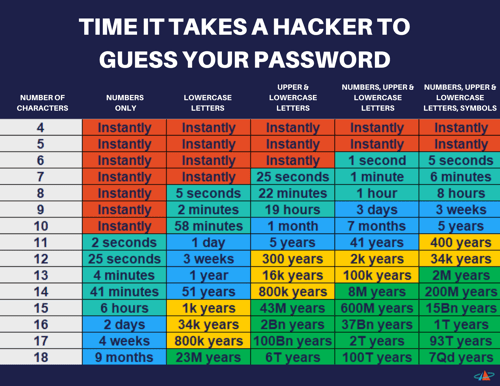The benefits of changing your password often cannot be underestimated. Your computer stores and provides access to a lot of sensitive information. Even more so when connected to a network that houses the information of your clients. Keeping all of this data safe and secure must be a priority. It is wise for organizations to have a password policy that requires employees to change their passwords regularly. Passwords should also be unique for each account. pim recommends changing passwords every 90 days (about 3 months).
According to Thytoctic, 80% of all cyber security attacks involve a weak or stolen password. Changing your password quarterly reduces your risk of exposure and avoids a number of IT Security dangers. Unfortunately, passwords are often neglected. We have enough to worry about without thinking of changing our eleventy-million passwords, right? However, the problem is hacking and security breaches are on the rise.
Protecting your data starts with securing passwords. Passwords are your first line of defense against cyber-attack. So, let’s look at why you should change your password often, when you should change it, and some best practices for choosing a password.
Why Should You Change Your Password Often?
LIMITS BREACHES TO MULTIPLE ACCOUNTS
If you use the same password for all your accounts, if one gets hacked, you should assume the others will be as well. Each account should have a unique password. For example, you should not use your Facebook password as your work password or your Target password for your mobile banking password.
PREVENTS CONSTANT ACCESS
A hacker may attempt to access your account more than once over a period of time. Changing your password often reduces the risk that they will have frequent access.
PREVENTS USE OF SAVED PASSWORDS
If you lose or change computers, it is possible for someone else to gain access to your passwords. Regularly updating your passwords means that even if someone finds an old or saved password, it will no longer be useful, and your data will be secure.
LIMITS ACCESS GAINED BY KEYSTROKE LOGGERS
A keystroke logger is surveillance technology use to record keystrokes. It is often used to steal credit card information as well as login credentials. Regularly changing your password makes it less likely that passwords obtained this way will be useful for any length of time.
When Should You Change Your Password?
- After a security breach. If you have been subject to attack or have been made aware of a breach like the Capitol One of Target breach, you need to change your password. When a company tells you that they have experienced a data breach, it is safer to assume that your password is no longer secure.
- If You Suspect Unauthorized Access. Do not wait until there is glaring evidence that you have been hacked. By that time, it is usually too late. If you suspect someone has attempted access or if you receive an email that an unauthorized user has logged into one of your accounts on a new device, change your password as soon as possible.
- If You Discover Malware or Other Phishing Software. A virus can put your computer and your entire network at risk. If you discover such software after a scan, change your passwords immediately, preferably from a different device than the one upon which the virus was discovered.
- Shared Access. Lots of people share accounts like Netflix, Hulu, Amazon. If you share your login information with someone that you are no longer in contact with, change your passwords as often as possible. This is especially true if you have a change in family status, such as a divorce.
- Logging in at Public Places. If you visit the library or use a public network, change your password afterwards. This will help you keep track of your digital footprint more securely.
- If You Haven’t Logged in for A While. You should always change passwords on accounts that have not been used in over a year. The more often you change your seldom-used passwords the better you will be. Especially if you are not using two factor authentication.
Password Creation Best Practices
- 2 Factor authentication is your friend. This means that to access any account, anyone trying to access it will face a second hoop to jump through. This usually looks like texting a code to your phone and then inputting that unique one-time code to login.
- Audit Your Passwords. Do you use the same password in multiple places? Time to stop that. Do you include things like your name in them? Series of numbers in a sequence? Time to stop that, too.
- Choose passwords that are long and varied. Passwords should have at least 12 characters that utilize uppercase and lowercase letters, as well as numbers and special symbols. Does this seem hard to do? Try to spell a word that is important to you but with numbers and characters replacing letters so that you can remember it. For example, ThisB10gRock$! Would be easy to remember, since, you know this blog rocks.
Managing your passwords can seem a daunting task. But it truly is your first line of defense against security breaches. Remember the adage. Passwords are like underwear, change them often. Do not share them or leave them on your desk, and they are better when they are exotic.